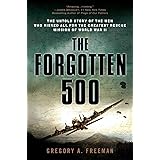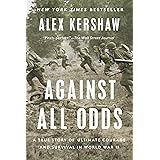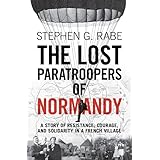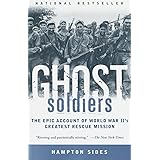
Download the free Kindle app and start reading Kindle books instantly on your smartphone, tablet, or computer - no Kindle device required.
Read instantly on your browser with Kindle for Web.
Using your mobile phone camera - scan the code below and download the Kindle app.

OK
 Audible sample Sample
Audible sample Sample 


The Forgotten Highlander: An Incredible WWII Story of Survival in the Pacific Hardcover – October 1, 2010

Explore your book, then jump right back to where you left off with Page Flip.
View high quality images that let you zoom in to take a closer look.
Enjoy features only possible in digital – start reading right away, carry your library with you, adjust the font, create shareable notes and highlights, and more.
Discover additional details about the events, people, and places in your book, with Wikipedia integration.
A remarkable story of survival during World War II—a Scottish soldier that survived work camps, five days adrift at sea, and the atomic bomb!
Alistair Urquhart was a soldier in the Gordon Highlanders, captured by the Japanese in Singapore. Forced into manual labor as a POW, he survived 750 days in the jungle working as a slave on the notorious “Death Railway” and building the Bridge on the River Kwai. Subsequently, he moved to work on a Japanese “hellship,” his ship was torpedoed, and nearly everyone on board the ship died. Not Urquhart. After five days adrift on a raft in the South China Sea, he was rescued by a Japanese whaling ship.His luck would only get worse as he was taken to Japan and forced to work in a mine near Nagasaki. Two months later, he was just ten miles from ground zero when an atomic bomb was dropped on Nagasaki. In late August 1945, he was freed by the American Navy—a living skeleton—and had his first wash in three and a half years.
This is the extraordinary story of a young man, conscripted at nineteen, who survived not just one, but three encounters with death, any of which should have probably killed him. Silent for over fifty years, this is Urquhart’s inspirational tale in his own words. It is as moving as any memoir and as exciting as any great war movie. 24 color illustrations
- Print length320 pages
- LanguageEnglish
- PublisherSkyhorse Publishing
- Publication dateOctober 1, 2010
- Dimensions0.63 x 0.12 x 0.93 inches
- ISBN-10161608152X
- ISBN-13978-1616081522
The Amazon Book Review
Book recommendations, author interviews, editors' picks, and more. Read it now.
Similar items that may ship from close to you
Editorial Reviews
Review
“A story of almost unimaginable suffering.” (BBC Radio 4)
“Riveting, powerful, moving.” (The Observer)
“A remarkable memoir.” (Financial Times)
“In his memoir, Urquhart employs matter-of-fact prose that is somehow perfectly appropriate to describe the horrors he experienced. Although grateful and positive about the many benefits in his long life—he describes himself as a lucky man—he is angry at the Japanese government's lack of acknowledgment of Japan's wartime abuses, and he feels neglected by his own government. His story makes clear that he has every right to feel that way.” (Library Journal)
“Memorable, vivid, relentless.” (The Herald [UK])
“Urquhart. imprisoned in the Kanyu camps, forced to build the Death Railway, herded on the 'hell ship' Kachidoki Maru, and forced to work in mines around Nagasaki, is in a survival league of his own.” (The Times [London])
About the Author
Product details
- Publisher : Skyhorse Publishing; First Edition (October 1, 2010)
- Language : English
- Hardcover : 320 pages
- ISBN-10 : 161608152X
- ISBN-13 : 978-1616081522
- Item Weight : 7.8 ounces
- Dimensions : 0.63 x 0.12 x 0.93 inches
- Best Sellers Rank: #1,324,647 in Books (See Top 100 in Books)
- #704 in Scotland History
- #1,813 in Japanese History (Books)
- #12,376 in World War II History (Books)
- Customer Reviews:
About the author

Discover more of the author’s books, see similar authors, read author blogs and more
Customer reviews
Customer Reviews, including Product Star Ratings help customers to learn more about the product and decide whether it is the right product for them.
To calculate the overall star rating and percentage breakdown by star, we don’t use a simple average. Instead, our system considers things like how recent a review is and if the reviewer bought the item on Amazon. It also analyzed reviews to verify trustworthiness.
Learn more how customers reviews work on Amazon-
Top reviews
Top reviews from the United States
There was a problem filtering reviews right now. Please try again later.
I will start my short review at the ending of the book. The last chapter of the book was devoted to Alistair's life after he returned from the war. This was the most powerful and often neglected part of many historical books about the war. For me, it was certainly the most emotional part of Alistair's story. It literally brought tears to my eyes. The devastating aspects that he, and hundreds of thousands of others, had to endure and cope with due to the utter brutality and evil at the hands of their Japanese captors is chilling and overwhelmingly sad. This book is worth reading if just for an understanding of what these poor chaps, of any nationality, had to cope when the war was over. Of course, "their war" was never over...for them it was forever.
That being said, I gave the book 4 stars because I found the beginning of the book, almost a third of it, to be focused on Alistair's life before being conscripted. While it was important to understand who Alistair was as a person to establish an emotional connection I felt that this connection could have been made with much less repetition.
The majority of the book was devoted to his time served as a POW. During this time he was transferred to different POW camps and locations, the most interesting being his work on the Death Railway and bridge at the River Kwai. You will soon discover the ridiculously sanitized version of this experience if you've ever seen the movie Bridge Over the River Kwai. If you've never read any history about Japanese brutality during the war Alistair's POW experiences will be powerful and almost incomprehensible to imagine. I have read many books about the Pacific War so much of this part of the book was repetitive for me, but it is always a good reminder of the horrors and atrocities of war.
IF you have a good knowledge of this history and the Japanese military this book will be repetitive in parts but the ending will make the it all worthwhile.
Beautifully written and a story that needs to be told.
Everyone should read this.
Urquhart was conscripted to work on the famous Bridge on the River Kwai, all the while surviving on a cup of rice and water per day. Beatings became the norm, and soon, Urquhart was suffering from several different tropical diseases. He worked on the bridge for 750 days.
After his work on the bridge, Urquhart was put on one of the Japanese "Hell Ships" to be sent to a labor camp in Japan. En route, the ship was sunk by an American submarine, throwing Urquhart and his comrades into the water. Some of the prisoners were rescued by friendly submarines, but Urquhart was not as lucky; he was picked up by a Japanese ship and resumed his voyage to Japan. Once there, he began working outdoors in a mine near the town of Nagasaki. By August, 1945, the Japanese were beaten. The first atomic bomb had fallen on Hiroshima and one day while Urquhart was working outside, he was knocked over by an extremely hot blast of air. Looking north toward Nagasaki, Urquhart saw a towering cloud over the city. He did not know it at the time, but he had felt the effects of the second atomic bomb that destroyed the city. Urquhart had somehow managed to survive the war, weighing only 82 pounds at the end. He managed to work his way back to Scotland and began to get back to life.
This is a very interesting story told through the eyes of a former POW. I've read many books about the fate of Allied POWs at the hands of the Japanese, but I'm still sickened each time I read about these terrible atrocities the Japanese committed yet still refuse to admit. Many Japanese companies, including the one Urquhart slaved for, benefited from POW labor, yet they still refuse to admit it. Urquhart had to endure virtually daily beatings, solitary confinement, little or no medical care, and virtually no food and water, yet he survived. it is a testament to all POWs who managed to survive such unimaginable treatment.
I recommend this book to all readers of Pacific War history. Urquhart's story is one of resilience, determination, and stubbornness, and this book accurately portrays the atrocities that Allied POWs were forced to face.
Top reviews from other countries
Wer kennt nicht den Film über die Brücke am Kwai?
Heldenhaft, mannhaft, ehrenvoll...
...nun, die Realität sah anders aus.
Wie, das findest Du in "The Forgotten Highlander".
Überheblichkeit. Ignoranz. Standesdünkel.
Die Engländer werden von den Japanern überrannt.
Ein junger Schotte wird von den Japanern gefangen genommen.
Er marschiert mit Hunderten anderen Gefangenen in den Dschungel.
Bewacht und gefoltert von sadistischen japanischen Soldaten,
bauen sie an der Thailand-Burma Eisenbahn und der "Brücke am Kwai".
Die Todes-Eisenbahn. Ein Toter pro Schwelle.
Und das ist noch lange nicht alles.
Der Autor war dabei, hat überlebt, kam lebend zurück und findet den Mut, seine Erinnerungen aufzuschreiben, als er bereits über 80 Jahre alt ist.
Immer, wenn Du beim Lesen denkst, jetzt kann es nicht mehr schlimmer kommen,
setzen Menschen dem Leiden und der Ungerechtigkeit noch eins drauf.
Du möchtest schreien, weinen. Manchmal ist es fast nicht auszuhalten.
Gerade deswegen halte ich "The Forgotten Highlander" für ein wichtiges Buch.
Nach der Lektüre geht es Dir gut, weil Du erkennst, dass Du an Luxusproblemen "leidest".
Dieses Buch verändert die Sicht auf viele Aspekte des Lebens.
Auf den Wert des Lebens.
Auf ein "Problem".
Auf das japanische Volk.
Auf "Schuld", "Täter" und "Opfer".
Auf den Wahnsinn, die Hölle, die durch Krieg entsteht.
Auf die Filmindustrie.
Auf die Menschen - was sie anrichten und was sie aushalten und überstehen können.
Nimm und lies. Deine Welt wird hinterher eine andere sein.
.














